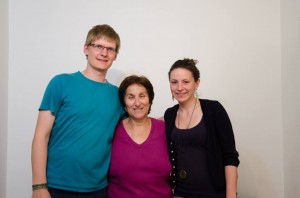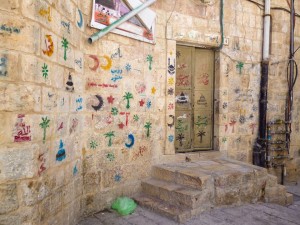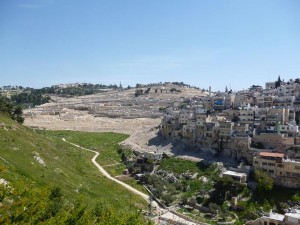Coming to the region in mid 2014, after months of preparations, we were filled with feelings of both excitement and worry. It felt great to finally be able to put our ideas into practice, test them against reality, but, at the same time, that thought was scary. What will our interview partners think of our idea? Will they even agree to being interviewed? Will we be able to get the content that we wanted? Even the best preparations can be no guarantee. So we were hopeful, while expecting ups and downs.
“Conflict is Omnipresent”
Arriving in Israel, we quickly realized how the conflict is omnipresent. Wherever we went, you could find signs of it. Walking through the streets of Jerusalem, a multicultural city, one could feel a certain tension between people. Strikingly, at the same time, there were islands of apparent peace and rest. Though highly dependent on the location we were at, like the closeness to the wall, which side of the wall we were on, we still had the impression that everywhere people had found ways to distance themselves from the situation, creating unperturbed moments and places. This stark contradiction of apparent and violent conflict from the peaceful and beautiful moments, was completely new to us and very thought provoking. Having been exposed to the complex situation in this region, people seemed to try to escape from the daily influence of the conflict and cope with the situation.
In general, our stay in the region was a highly reflective time. Traveling with a purpose and theme made us perceive things in a special light and interpret situations against a common background. Different from the normal tourist experience, our experience was more focused, deeper but also much more limited. It made us understand one aspect of the region very well, while mostly ignoring others. Here, the advantage of traveling as a team of two really kicked in because more focused experience also meant a lot of personal reflection and thinking could be shared between us. Traveling together, we were able to collectively make sense of what we had seen and untangle our individual thoughts.
“Life in Kibbutz Ketura”
Soon, our worries about the reactions of our interviewees quickly vanished. While many had a lot of questions before agreeing to be interviewed (who wouldn’t?) we were met with a lot of enthusiasm and positive feedback. On the whole, we received a lot of support and hospitality from many different people. Staying at the Arava Institute for Environmental Studies proved to be a heartwarming experience as we were quickly integrated into the students’ group and were able to share a few days of life in the Kibbutz Ketura together. Coming with such a focused intention to the Kibbutz gave us the opportunity connect with the students on a different and meaningful level. While conducting several interviews there, we found that the interviewees were very open in telling their stories, which reassured us and we felt more and more comfortable with the work we set out to do. With this positive experience we traveled further to meet other Israelis and Palestinians.
“Self preservation”
However, working on such a complex topic and feeling the tension in the region pushed us to longing for some break in between. We decided to take one day off and rest at the dead-sea to process all the stories we heard and all the situations we saw. This day gave us renewed energy to continue with the project work, and head into some intense last days meeting people in the Westbank. Now, seeing life from the other side of the wall, further highlighted the different realities people experience in this region. We were shown around in Bethlehem and Hebron, saw historic places and heard more stories that added to the thinking bag.

Looking back now, we have to be thankful for everyone we met in the region. Everyone who provided us with even the most slightest help, everyone who agreed to host us, answer our questions, and helped us in finding other interesting people to talk to. Ultimately, it was everyone we met on the road who supported us in realizing the Narratives Project.


